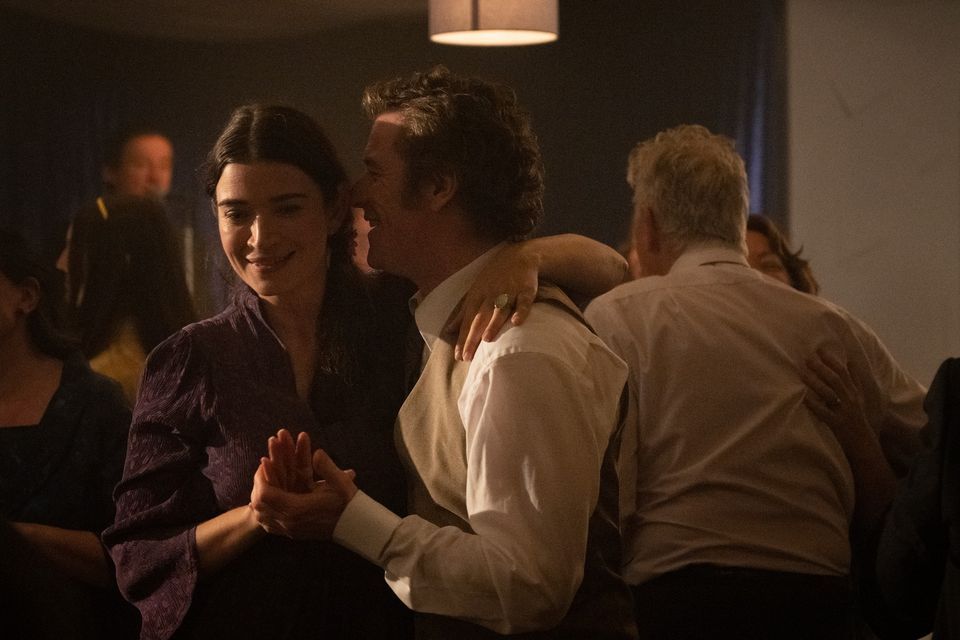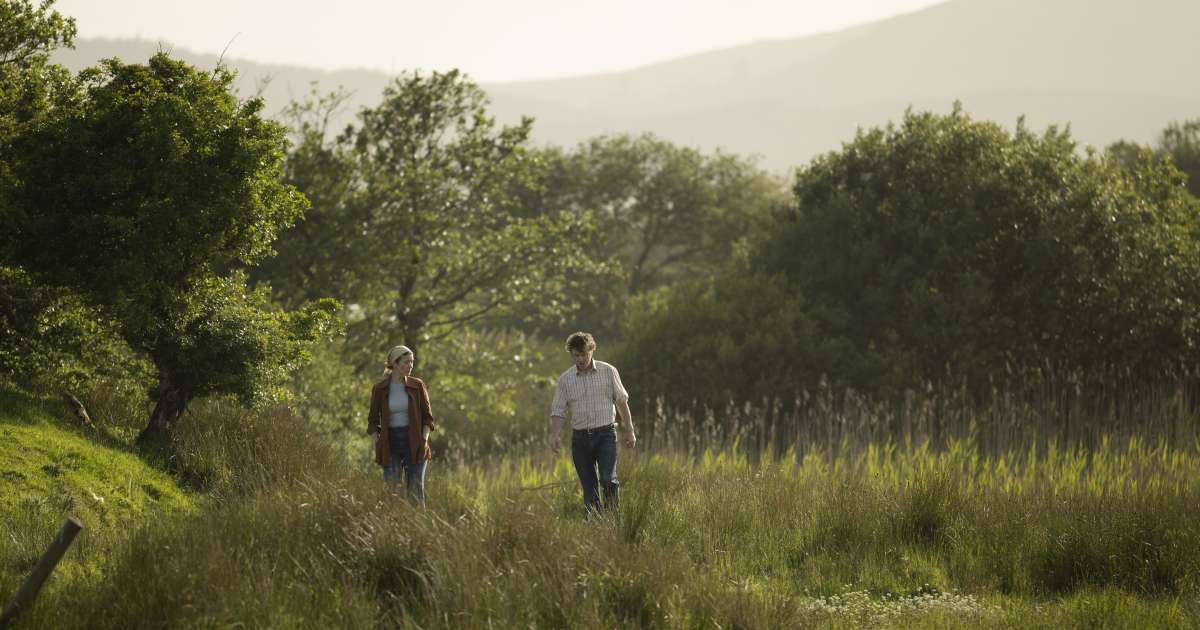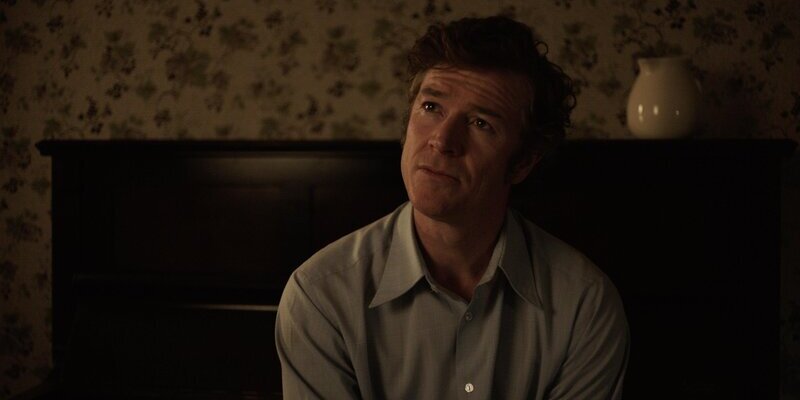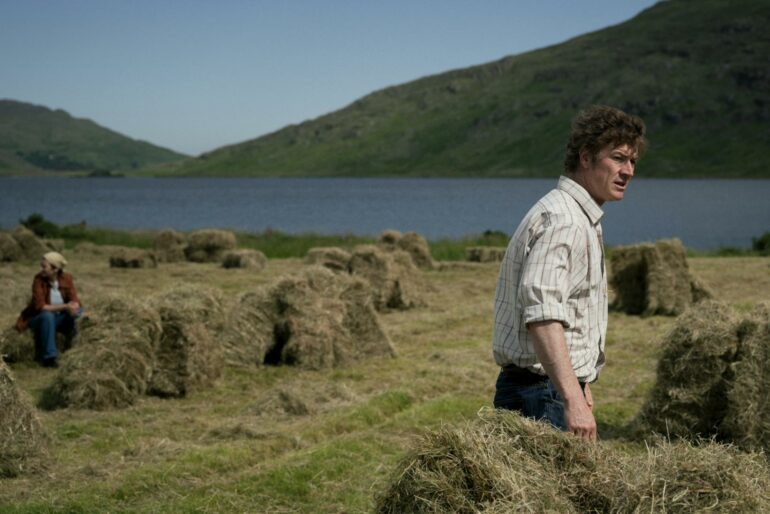John McGahern’s 2003 novel That They May Face The Rising Sun sounds like perfect material for writer-director Pat Collins. The acclaimed director of Song of Granite and Silence brings his calm and patient eye to this tale of two emigrés, Joe and Kate (Barry Ward and Anna Bederke), returning to Joe’s home in rural Ireland from London for a different pace of living. Collins and co-writer Éamon Little’s adaptation stays true to McGahern’s spirit. It honours the spirit of rural communities, while also probing the sameness that isolates them.
We meet Collins in London, the day after That They May Face The Rising Sun received a warm reception at its premiere at the London Film Festival. We start by going back to the beginning…
How long did you have it in mind to adapt McGahern’s novel?
I think as far back as when I made the documentary (2005’s John McGahern: A Private World) which, I’m not sure that I would have thought about myself making film at that stage. What I would have thought is that it would make a great film. It’s not even that I think it’s screaming to be adapted. I don’t actually think that many people would take it on, because it’s a difficult one to adapt, and because there’s very little plot. It’s gentle unfolding stories going on throughout. The seasons, the passing time, is the kind of thing that’s probably most memorable about the book.
At the time, I thought I might just send it to John. I have no great recollection of having a conversation about it, except to say that I thought that it was his best work. I probably would have told him that I think that book is probably the book that I would have had the strongest connection to. Rising Sun, for me, was just the most beautiful book, and I really loved it. I think it’s my favourite Irish novel. It connects very deeply with me, because the community that I came out of is very similar to his. He’s writing about the community that that generation came out of, and I don’t think anyone’s ever gone to do it as well, again. It’s passing, or if not past, on the way out.
Making the film took a long time. We started the script in 2015, with lots of drafts, then casting, production, post. From once we started on the script, it took about 7 years to get the film made.
Having premiered the film at the London Film Festival, do you think the film translates, or is it made for a particularly Irish audience?
It’s too early to say. I genuinely don’t know. I do think it’s going to connect strongly with an Irish audience, but I feel that the way Ireland was at that time, and the book that McGahern wrote, connected very strongly with audiences in France and America. I think there’s lots of themes in, about leaving the busy city, and going into the country and then leaving it. When we were making it, it seemed quite on the nose at the time, in relation to Covid and all that. There was a big movement of people talking about leaving the city and going to the country. I suppose it’s still relevant in that regard. I do feel like it’s almost a peasant society, and I don’t use the word pejoratively. I do think that the community or the society in Ireland was the same way as it was in Italy, in the south of Poland, and rural France and Spain, it should resonate strongly in those countries, too. But it’s very hard to judge.
The one thing I don’t know is how it will be received and I have no hope it’s going to connect with people. It’s quite low-key and very gentle. The marketplace is anything but that. It’s like a juggernaut, all about its loudness and being bombastic This film was the opposite of that. I look at that other stuff, and it’s gonna be interesting to see how it’s received.

Do you see it as an antidote to bigger films?
I don’t. I wasn’t making it with that intention of that. It’s the material that drew me, and it’s to do with time, and the passing seasons. That’s the material that I like being around, and the characters that are in it. Every single character in the book is in every single village in Ireland at a certain time. With these characters, Patrick Ryan (played by Lalor Roddy), Jamesie (Phillip Dolan), Johnny (Sean McGinley), it should resonate. They’re still there, but it’s just that it’s much more fragmented, and they’ve more opportunities now. It’s not that hard to find, but you have to slow down and live in a place to actually know them. You won’t meet them on a long weekend in the countryside!
Some people see your films as ‘slow cinema’. Do you think they are? If so, does that tag make it more difficult to get them made?
I don’t necessarily feel like I’m in that group. The slow cinema movement, I don’t feel part of it, even though a lot of my films are kind of would be considered slow and are slowly paced. I feel like it’s a thing I’ve had from before I knew slow cinema existed. I think ‘slow cinema’ is slow for the sake of it sometimes. I think it can even cover up a certain mediocrity sometimes by just slowing everything down and saying that’s the way you intended it to be. wouldn’t have that kind of a great connection with all of ‘slow cinema’ but I love a lot of it as well. I don’t feel very connected into what’s going on in it at the moment. I probably look backwards rather than look at what’s going on at the moment. If there’s a scene going on, I certainly don’t feel a part of it. It’s the difference between cinema as an art form and cinema as entertainment. It’s not that I don’t think this film isn’t entertaining, but I think you probably do have to meet it in terms of the pace, and get into the flow of it. It’s not going to scream for your attention.
It is a harder sell. It’s incredible, the the amount of funding that’s there in Ireland now to make cinema. I think we funded this film nearly entirely from within the 32 counties, and that is great. I feel that I have been a beneficiary of that funding system that Michael D. Higgins put in place so many years ago. I’ve always felt supported, from the likes of Screen Ireland and RTÉ. It’s not a huge amount of money, but it’s still significant. I feel stronger going into making a film if the national broadcaster is behind me as. It’s not like a national cinema, but it’s kind of I feel like I’m making cinema that’s important to the country. That’s going to can seem like a very grand statement or, but that backing is a welcome validation.
I don’t know, if I’m going to be able to work on the scale again. If it’s very successful, then I’ll probably find it easier to get funding. If there’s not an appetite for it, it might be harder to get. I’m making a documentary at the moment, and the next thing I make might be another documentary. I’m not trying to build a career in that kind of way. If the material I’m interested in at the time is a feature or a documentary or something else, I go with that whatever way I feel at that time. I’m a bit too old now for building a career!

Another backer of the film is the National University of Ireland, Galway (NUIG), where McGahern taught. How involved were they?
NUIG bought John’s archive back in the 1990s. They have the whole John McGahern archive. We approached them for funding, and we just thought it was a natural kind of partnership. For the next three years, I’m going to give some lectures there in relation to John McGahern, show the film to the film students, and then (producer) Philip King is going to give some lectures there on entrepreneurship and the arts. We’re delighted to have them on board; it makes sense. Within a small country, it’s right that we should be working together to promote John’s work as well. It’s very easy for the work to slip by. There are lots of writers who have slipped off the radar. I think you need things like the film coming out, or universities pushing the work to make sure that it’s actually still stays relevant. It allows young people coming up to still get an opportunity to read them, and so I think that this is this is very good. Having NUIG in there is like RTE being involved. It’s great to have a university in Ireland backing the film. It makes a lot of sense.
My sister went to university in NUIG, and she studied English. There was a gang of us that were all living in Galway at the time. John McGahern was the lecturer there in a course on literature. He had a reading list of hundreds of books, and my sister would come back from college with the list. She’d bring all the books and then we’d all read the books that he had recommended. I didn’t go to college, but it was an education. When everybody’s reading the same books, and everybody’s talking about the same books, you learn so much from those conversations.
Some of the best scenes in the film feature Joe just sitting down and writing, with Barry Ward narrating text taken from the novel. Was it difficult to balance McGahern’s vision and story with your own sensibilities?
One of the luxuries we took was making Joe a writer. In the book, he isn’t a writer. He’s working in advertising. It’s very vague. There’s not much talk about what his job entails. The funny thing is that in the book, I always felt like he was the writer, rather than the person who’s working in advertising. When it came to adapting it, I felt it makes much more sense if he’s a writer, and he’s a farmer too. That’s very close to John, and I didn’t want to go into the biographical elements, or say that people should feel that i this character is John McGahern. I’d still strongly think it’s Joe Rutledge, it’s the fictional character, but there are passages in the book that I really wanted to include, and there was no way of including them without making him a writer.
I think that it does help the audience to have Joe and Kate there, especially I imagine for foreign audiences, because they’re like the audience really. Characters like Jamesie, Johnny or Patrick won’t be identifiable to everyone. If you don’t understand it, at least you know that maybe Joe and Kate don’t fully understand it either. They’re witness to the sheer force of personality, and a kind of intelligence as well. The character of Patrick is highly intelligent. Given different circumstances, he could have been of an artistic temperament. If he was born in another part of the country, he might have been working in the civil service, or an artist or writer himself, who knows?
I made a documentary, Henry Glassie: Field Work (A 2019 portrait of the American folklorist). He wrote a book over the course of 10 years in a small townland in Co. Fermanagh. He described Hugh Nolan, one of his great teachers in the parish, as having the mind of an Oxford professor. He just didn’t have the opportunity to get noticed. It’s sad, but it goes to show that when you grow up in a small place, you’ve got maybe a village and it’s 400 – 500 people in the surrounding area, and you’ve basically got everyone you need there, You’ve got the genius, you’ve got the guy who’s artistic temperament, you’ve got the brute, you’ve got the woman who has that intelligence as well and is at home. It’s it’s kind of sad that they’re confined by their lives, but it made the whole life of those around them really enriching.

What’s your feeling on Irish cinema going forward? It seems to be in a good place, but from the inside point of view, do you think there’s anything we need to be wary of?
A very big question, and one I have to be careful answering! In terms of funding, I think it’s in a very, very good place. I still think that there’s maybe not enough of kind of individual voices coming out. I think there’s a push towards narrative cinema. That that is very, very debilitating, in some ways, and the trouble with that is that it forces everything to come out ooking the same. I’d prefer if there was more stuff being made that was coming from a world cinema context. Very few are making films from an actual Irish viewpoint. They’re making stories that could be set anywhere. I think that even some of the Irish language stuff is maybe not necessarily coming out of the culture either, though some of it is too. I think we’re definitely in a good place and a better place in terms of funding. But I think I think it needs to keep pushing and raising its game.
That They May Face The Rising Sun closes the 2024 Dublin International Film Festival on 2nd March, and comes to cinemas in April.

